Back to Theater


|
|
|
|
|
|
|
|
|
|
|
|
|
|
| |
|
Site contents © 2000-2015 by EFi.
|

| O.P.C., Dec. 2014 - Jan. 2015 |
 O.P.C. - American Repertory Theatre Auditions O.P.C. - Equity Principal Auditions in Boston Date of Audition: Wednesday, May 21, 2014 Location: Loeb Drama Center, 64 Brattle Street, Cambridge, MA 02138 Contract: LORT Non-Rep, $812/week minimum Other Dates: 1st rehearsal: October 20th, 1st performance: November 29th, Open: December 3rd, Close: January 4th. Role BRUCE: (Male, 50s-60s) Handsome, appealing, intelligent, light-hearted. Often uses humor to be supportive. The peace maker in the family. SMITH's husband and ROMI and KANSAS' father. Source: Broadwayworld, May 8, 2014
"O.P.C." : Written by Eve Ensler; directed by Pesha Rudnick; Scenic Design, Brett J. Banakis; Costume Design, ESosa; Lighting Design, Bradley King; Sound Design, Jane Shaw; Projection Design, Shawn Sagady; Movement, Jill Johnson; Production Stage Manager, Taylor Adamik; Casting, Stephen Kopel Cast in order of Appearance: Romi, Olivia Thirlby; Smith, Kate Mulligan; Bruce, Michael T. Weiss; Mrs. M and others, Nancy Linehan Charles; Sister Ro and others, Liz Mikel; Prakash and others, Babak Tafti; Kansas, Nicole Lowrance; Damien, Peter Porte 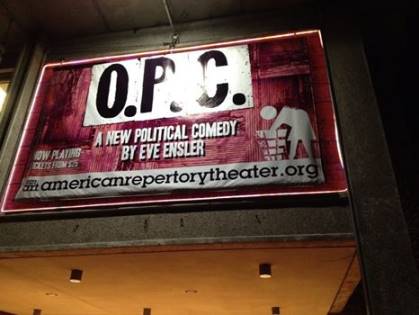 O.P.C. Banner above the entrance to the American Repertory Theater. Photo: Katie Cueva A picture collection A dialogue with Eve Ensler "O.P.C." the letters stand for obsessive political correctness premieres Friday at the American Repertory Theatre's Loeb Drama Center in Cambridge. Eve Ensler is talking about a predicament she has found in folks whose politics run left of center. Folks, that is, much like her. "I think on those days when you stumble into the thick of reality you feel a kind of madness," says Ensler, the playwright who came to fame in the mid-'90s with "The Vagina Monologues." "There's nothing to do with everything in your brain. You know everything, you know too much. ... What do you do with it? I would describe that as what obsessive political correctness is." If you're Ensler, you write a play called "O.P.C." the letters indeed stand for obsessive political correctness which premieres Nov. 28 at the American Repertory Theatre's Loeb Drama Center in Cambridge and runs through Jan. 4. The plot revolves around the clash between Romi (Olivia Thirlby from "Juno"), a 25-year-old, left-wing dumpster-diving freegan (a radical, foraging vegan) and squatter, and her mother, Smith (Kate Mulligan, replacing Melissa Leo, who left the production because of "artistic differences," according to A.R.T.), a liberal who is running for the U.S. Senate. Romi's father and Smith's husband, Bruce will be played by Michael T. Weiss. He's filling in for David Thornton who dropped out because of a back injury; Stephen Collins, originally cast, took himself out of the play amid divorce proceedings, followed by accusations of child molestation. We spoke by phone from New York. Source and interview by Jim Sullivan: Cape Cod Times, Nov 21, 2014
A.R.T. Embraces Eve Ensler's Obsessive Political Correctness CAMBRIDGE, Mass. It isn't until deep in the second act that the word "vagina" pops out of a character's mouth in Eve Ensler's "O.P.C.," which is in its world premiere by American Repertory Theater. But it does remind us why we're here: The new work is by the esteemed author of "The Vagina Monologues," whose signature orifice she liberated from the realm of the unmentionable to wrack feminist havoc upon the stage and in the world. Ensler's heartrending and incendiary 1996 collection of monologues (which she first performed herself) not only won an Obie and made the writer an icon but also launched a global movement to end violence against women. To borrow a label the play espouses, there is no freegan way "O.P.C." (at the Loeb Drama Center through Jan. 4), despite its urgent environmental and social concerns, will have such ramifications. An awkward, hyped-up mix of agitprop and Wendy Wasserstein, the new play sandwiches a political debate into a clichιd drama about a mother-daughter conflict in which the ambitious mom, seeking a Senate seat for mostly the right reasons, clashes with an idealistic offspring convinced the system is too broke to be fixed. Daughter Romi is a Harvard dropout and a dumpster-diving evangelist whose personal war against the "tyranny of the new" includes camping in a squat and eating so-called garbage. (And you thought the Bush girls, swigging margaritas while underage, were a political liability.) One thing the scavenging Romi is intent on is creative recycling, and the play has some fun with that even as it advocates for it. We first meet this dreadlocked, nose-ringed pixie in her psychedelically decorated warehouse squat, where she's filming an episode of "Waste Not Want Not," a self-produced weekly show "birthing the new paradigm," while fashioning a dress out of discarded drinking straws. Then she shows up at mother Smith's senatorial-campaign launch bearing yet another piece of "high trashion," a slinky dress made for mom out of apricot skin. Handed a lemon, or in this case an apricot, Smith makes apricot-ade and puts the thing on. Voila, she looks like a million dollars, not a large Fruit Roll-up, and an environmentally friendly business is born, strutted, and winked at. At A.R.T. set designer Brett J. Banakis takes the recycling cause to heart, decking Ensler's cri de coeur in a massive, sparkling array of cardboard cartons, wooden palettes, old junk, and plastic bottles that do make Romi's encampment "magical." And costume designer Esosa tosses various styles into a sartorial fruit salad. But among the detritus being put to creative reuse would seem to be 1960s theater itself, complete with flashing lights, pounding music, and colorful graffiti on bed sheets. Did someone dive into artistic director Diane Paulus' Tony- and Elliot Norton Award-winning revival of "Hair" and climb back up with the whole Age of Aquarius? And if the sympathy between production and theme is more than a gimmick, where's the dumpster full of coffee and cookies for the audience to root through at intermission? At the core of "O.P.C." which stands for Obsessive Political Correctness, a disease with which Romi is eventually diagnosed is a debate between well-meaning, garden-variety liberalism, which is making little headway in the race to save the planet, and an impassioned extremism that eschews capitalism as a contributor to such problems as global warming and economic inequity. But in Ensler's telling, its hardly a fair fight. Curiously, since the 61-year-old Ensler is a card-carrying member of the "Heidi Chronicles" generation, she has made Smith something of a feminist shrew who wants less to change the world than to win, win, win the chance to do so. Oscar winner Melissa Leo, originally slated to play the part, dropped out of the production over what were called "artistic differences," and one can see why. If Smith were just a ruthless caricature, that would be one thing. But Smith is also supposed to be a committed Democrat and caring mom paving the way, as she walks over men including her nice husband and an opportunistic lackey, for her daughters. Romi, by contrast, though her cohort is thinly parodied (along with various journalists, including Oprah and Baba Wawa), is a sweetheart worrying herself sick (or so the psychiatrists say) over mindless consumerism, climate change, the ozone layer, endangered songbirds, and polar bears. Even her crack-up, when she goes orgasmic over Prada boots and begs for rough sex, is adorable in its squirmy way. And though reference is made to Romi's not bathing, she looks, in the person of actress Olivia Thirlby (the films "Juno" and "Dredd"), both clean and, whether in blueberry or seaweed, chic. Ensler obviously cares, well, obsessively, about the issues that her play (which has been in the making for years; there was a reading in Santa Monica in May 2009 [More about this reading with Stockard Channing, Brenda Currin, Greg Itzin, Ravi Kapoor, Analeis Lorig, Liz Mikels, Lee Pace and Andrea Riseborough]) invokes. But though the finished product includes broad parody and send-ups of both omniscient psychiatry and the runway, the playwright has not written a political farce or satire α la Dario Fo. Instead, "O.P.C." cloaks its agenda in a family drama that's more strident than complicated. One critic described "The Vagina Monologues" as being both "a polemic and a poem," but there is little poetry here unless you count a brief, sweet scene between Romi and a fellow inmate at the "healing facility" to which shes remanded after having an inconvenient breakdown. Thirlby goes farthest toward making her character a distinct person with an endearing nervous laugh and a bravura way with those boots. There is also a sharp turn by Nicole Lowrance as Smith's more conservative daughter, Kansas, who spurts a geyser of sibling jealousy about Romi's being named for the city of gladiators, Fellini, and Gucci while she bears the moniker of an unglamorous locale both corny and flat. Michael T. Weiss is aptly innocuous as the girls' virile-milquetoast dad, and Kate Mulligan does her best to let some tenderness leak through Smith's chiseled veneer. But both the play and Pesha Rudnick's production, with its retro onslaught of sight and sound enhanced by oft-multiplied multi-media, seem past their shelf date. Perhaps that adds to the point about never throwing things out? Source: Carolyn Clay, The Artery, Dec 7, 2014
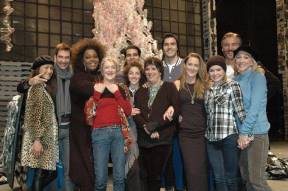 Actor
Dylan McDermott and his "Stalker" costar and real-life romantic
partner Maggie Q attended a Saturday performance of Eve Ensler's
play "O.P.C." at the American Repertory Theater in Cambridge.
McDermott, formerly of "The Practice" and "American Horror
Story," is Ensler's stepson. We had heard that McDermott and Q -
whose show premiered on CBS in October - have been together for
months, but the ART said she's his fiancιe, so congrats to the
couple. After the play, McDermott and Q (above, far left) posed
with Ensler and the "O.P.C." cast, which includes Olivia Thirlby
from "Juno" and Oregon Shakespeare Festival favorite Kate
Mulligan, whose TV resume includes "The Practice." Photo: Kati
Mitchell/ART Actor
Dylan McDermott and his "Stalker" costar and real-life romantic
partner Maggie Q attended a Saturday performance of Eve Ensler's
play "O.P.C." at the American Repertory Theater in Cambridge.
McDermott, formerly of "The Practice" and "American Horror
Story," is Ensler's stepson. We had heard that McDermott and Q -
whose show premiered on CBS in October - have been together for
months, but the ART said she's his fiancιe, so congrats to the
couple. After the play, McDermott and Q (above, far left) posed
with Ensler and the "O.P.C." cast, which includes Olivia Thirlby
from "Juno" and Oregon Shakespeare Festival favorite Kate
Mulligan, whose TV resume includes "The Practice." Photo: Kati
Mitchell/ARTSource: Meredith Goldstein, The Boston Globe, Dec 8, 2014
THEATER REVIEW: Eve Ensler's 'O.P.C' is politically ambitious and has huge heart There's no question that "O.P.C" (Obsessive Political Correctness) by Eve Ensler is politically ambitious and has a huge heart. The play - it's almost more of a happening - tackles overconsumption in our world as it teeters on the edge of environmental implosion. And it tackles or attempts to tackle the question of whether the enormous issues we face are best approached by working within the system or by opting out of it. The play is being given its world premiere by American Repertory Theatre with Pesha Rudnick directing it. ART has taken the play's themes to heart, at least for this show, and has turned to recycled materials for much of Brett J. Banakis' set - cardboard grocery boxes, wooden shipping pallets, and plastic water bottles. And they don't provide paper playbills or press kits but make them available electronically online. At the heart of the show are a mother and daughter who are in conflict. The mother, Smith Weil (Kate Mulligan), is running for the United States Senate with a great willingness to play the game so that she might seize at least some of the reigns of power. Her daughter Romi (Olivia Thirlby), who has always done things her own way, is living as a freegan - eating leftover, day-old food she finds by dumpster diving, squatting in an industrial loft space, and making her own clothes out of whatever she can find. Smith arrives at her daughters "home" - think of an eco-friendly set for "Rent" - having never seen it before. She brings a little housewarming gift - wooden napkin holders with elephants on them. "These aren't going to work," says Smith. "I was imagining a table." The play could be billed as a political comedy. Romi immediately thrusts one on her arm as a bracelet. And she offers her mother bruschetta with bruised tomatoes she rescued from a dumpster. Smith is horrified and deeply concerned over how the connection with a freegan daughter could ruin her political chances. In a line that could serve as a political bumper sticker for the play, Romi says, "You want to be boss of the world. I want a new one." Ensler's sympathies clearly lie with Romi, although she pits the two against each other. From the get-go, Thirlby as Romi (the name comes from the fact she was conceived in Rome) is full of spunk, life, and charm. She's very appealing and clearly the best actor on the set. Mulligan as Smith spends too much of the opening scene shouting at Romi. It makes you want to say, "Just talk to her as a real person." The play hinges on a highly improbable invention. One day Romi brings her mother a dress she made for her out of apricot skins. At first her mother is aghast, but she finally puts it on, seeing that she can trade on her daughter's concern for the environment. Her boyfriend Damien (Peter Porte) soon has created a big business out of fruit skin dresses. Romi's father Bruce (Michael T. Weiss) has real sympathy for his daughter, and Weiss makes him a likeable, appealing guy as he tries to serve as the bridge between daughter and his wife/Romi's hard-driving mother. Romi's sister Kansas (Nicole Lowrance) is a prototypical conservative, business suit woman. Yes, she got the name from being conceived in Kansas. Thirlby brings a lot of pop to a scene where she caves for a moment and uses money from the fruit skin dresses to buy a pair of Prada boots that she has always wanted. She practically comes unglued, she is so thrilled. It's fun to watch. Much of the second act takes place in a mental institution where Romi has been committed for her obsessive political correctness and for caring too much. An amplified woman's voice speaks for the institution. True to Ensler's own inclinations (she's best known for the play "The Vagina Monologues"), Romi is told that one solution to her problem is sex. In one sense, the play is a hoot, but it doesn't really function as a play. There's nothing subtle about the characters or the storyline. It's more of a political polemic, but even that doesn't totally work. Smith is a hardboiled, hard-driving candidate with no real ideals of her own but who's willing to compromise to succeed. And while one can't help but love Romi, her lifestyle is hardly practical or something she could stick with for a lifetime. Neither character provides a real option. The play, however, does get us thinking about issues of overconsumption that many of us have ignored. In a talk-back session on opening night, Ensler spoke very movingly about the importance of fighting to save the world even if all the statistics show no hope. One can't help but love her. "O.P.C." When: Through Jan. 4 Where: American Repertory Theatre, 64 Brattle St., Cambridge Tickets: Start at $25 Iinfo: 617-547-8300: www.americanrepertorytheater.org Source: David Brooks Andrews, The Herald News, Dec 8, 2014
Ensler's 'O.P.C' strikes just the right balance Sure, there are preachy moments, but for the most part Ensler finds the tricky balance between drama and comedy, between making some serious points and inducing some genuine laughs. The actors, main and supporting, nail it. The characters, while exaggerated at times, are not caricatures, and all of them evolve their positions over the course of the play. CAMBRIDGE - The world premiere of Eve Ensler's play "O.P.C." at the American Repertory Theatre's Loeb Drama Center is billed as a comedy, but I confess my fear going into the 2½-hour (including intermission) production was that it might be more of a take-your-medicine-as-prescribed proposition. Why? "O.P.C." stands for Obsessive Political Correctness, and the last two words always bring a slight tremor. The woman who was set to co-star, Oscar-winner Melissa Leo, was by far the best-known actor in the cast, and she backed out late in the game owing to "artistic differences" with Ensler. In an interview with the Cape Cod Times last month, Ensler, writer of "The Vagina Monologues," defined her life as being very much about political activism, adding "I think the life of an activist is an amazing life." And we knew this: That the two main characters, young radical freegan Romi (Olivia Thirlby) and her liberal, Senate-contesting mother, Smith (Kate Mulligan, replacing Leo), would be fighting about doing the right thing. What's the better choice? Working within the system or abandoning the system altogether and going off the grid? As the battle on the left looms, the potential for didacticism and unbridled agitprop looms. Not to worry. Sure, there are preachy moments, but for the most part Ensler finds the tricky balance between drama and comedy, between making some serious points and inducing some genuine laughs. The actors, main and supporting, nail it. The characters, while exaggerated at times, are not caricatures, and all of them evolve their positions over the course of the play. When we meet Romi, the anti-consuming squatter, she is extolling the virtues of dumpster diving and trying to serve her visiting mother "adopted tomatoes," doing a video podcast called "Waste Not, Want Not." Smith is running for Senate, hoping her Harvard dropout daughter will not embarrass the campaign by extolling the pleasures of garbage. Or not yet garbage just food past its official expiration date. Romi makes a strong case for her virulent stance. "We crave new. What is new? New is shiny, unspoiled, virgin ... The secret about new it gets old very fast." Smith, at another point, says what Romi does most is induce guilt in everyone else. "Romi needs to wake up!" Smith's husband, Bruce (Michael T. Weiss), counters, "Romi's just asking us to pay attention." Romi's life is changed when she meets the apparently punky (but secretively corporate) Damien (Peter Porte). She falls in lust and, through his machinations inadvertently becomes a hip dress designer with her recycled "Fruit Skin" apparel. OK, it's a stretch. Success comes calling, but, no surprise, having money and a large loft her father bought for her does not sit well or bode well for the future. Act 2 begins with Romi's sensible sister, Kansas (Nicole Lowrence), and her parents in the lobby of mental hospital oops, a "healing facility." Romi is somewhere in its bowels having been diagnosed with Obsessive Political Correctness. It's a fake disease, but not so far-fetched. This compulsive need to do the right thing as the disembodied, unseen female voice of the hospital psychiatrist explains shows up mainly in "highly intelligent young women," and the "patients reject the diagnosis." Indeed, Romi says, "I'm not unhappy in my unhappiness." But she does find a kindred soul and a bit of solace with Prakash (Babek Tafti), who has Obsessive Compulsive Disorder. This is serious stuff Ensler and director Pasha Rudnick are dealing with here, but they are happy to steer into the funny zone often enough, with some of the best lines delivered by the supporting players. Mikel and Nancy Linehan Charles juggle several characters and, respectively, pull off superb Oprah and Barbara Walters-type TV talk show host parodies. For the Oprah character, named P, it's really all about feel-good self-aggrandizement. For the Walters character, named Joan, it's all about fake earnestness and a relentless speech impediment: "You're twailing," she tells candidate Smith, "but in the polls it's a close vote. Is it twue?" For us in the audience, at the heart of "O.P.C." is this: You"re forced to reconsider consumption and not just conspicuous consumption: How much can you really enjoy yourself the products you buy, the choices you make when you're aware of their potential negative impact? And then there's the larger issue that hovers: If human-enhanced climate change hastens the end of the world as we know it, none of that will matter anyway. The designers have created a colorful, splendiferous set that is composed of discarded and recycled objects including thousands of plastic bottles that are strung over the stage and audience. Various video screens bring TV and Internet podcasts to bright life. Various bits of punk rock songs punctuate the short down-time between scenes, giving the play an urgent kick in the pants. There is a lot of dialogue, and the music helps pick up the pace. And at the end, Joey Ramone's version of "What a Wonderful World" blares optimistically as everyone searches for common ground. Source: Jim Sullivan, Cape Cod Times, Dec 9, 2014
After a sharp start, ART's "O.P.C." loses steam CAMBRIDGE There's nothing wrong with educating and informing as long as you're entertaining along the way. So playwright Eve Ensler has every right to rail against the wasteful society we live in her new play "O.P.C." Ensler and the American Repertory Theatre, where the world premiere of the play is now being staged through Jan. 4, are not only talking the talk, they're walking the walk. Brett J. Banakis' eclectic set is made entirely from what the theater calls "recycled, found, and trashed materials." That includes shipping pallets, grocery boxes, and water bottles, to name just a few ingredients. The costumes include "fabrics" made from plastic garbage bags, plastic straws, candy wrappers, and newspaper. During the run, the ART is not selling bottled water and has declined to print programs for the show, although the program can be accessed via smartphone. You know that thing you're not supposed to be using in the theater. But advocacy alone even passionate advocacy does not a great play make. After a strong first act and a promising beginning to the second act, "O.P.C." loses its way and gets lost in the quicksand of preachiness and the weak development of an excellent idea. Romi Weil (Olivia Thirlby) has dropped out of Harvard and embraced the "freegan" lifestyle, squatting in an abandoned property, Web-camming a show called "Waste Not, Want Not," finding edible food in dumpsters and living life completely off the grid. She is a "recovering" consumer who lives off what stores and others have discarded and hasn't consumed anything new in years. All this is concerning to mother Smith Weil (Kate Mulligan), a district attorney running for the Senate, especially when she visits Romi and is offered a "recovered" tomato. "I can't eat garbage," she wails. But Romi, it turns out, will become an asset in the campaign when her "Fruit Skin" line of clothing colorful, wearable and edible becomes the foremost example of trendy "high trashion." As a liberal politician, Romi's sensibilities play to Kate's base. Costume designer Esosa has a lot of fun with the costumes not only the fruity ones, but later seaweed dress and cornhusk shoes. The supporting cast is strong. Michael T. Weiss is a sympathetic father by the numbers, providing a refuge for Romi from her more intense mother. Damien is a fellow "freegan" and love interest for Romi, winningly played by Peter Porte. Nancy Linehan Charles has some nice moments as one of Romi's fellow dumpster divers and later as a Barbara Walters-type interviewer, while Liz Mikel is an effective Oprah-stand-in in another segment in which the media "eats up" (pun intended) Romi's creations. Melissa Leo was originally tabbed to play Kate before withdrawing, and Mulligan gets points for coming in on short notice and taking on a rather whiney character who appears to put winning the Senate before the welfare of her child,. Nicole Lowrance has some nice moments as the overshadowed sister Kansas, content to help run her mother's campaign but endlessly discontented with her place in the family, and the attention paid to Romi. Thrilby's Romi is always interesting and engaging, even when she veers sharply off the reservation with her infatuation with Prada, and her later meltdown. That leads to a scene where a disembodied voice of a medical staffer informs the family that she has been diagnosed with O.P.C. Obsessive Political Correctness - a compulsive need to "do the right thing" when confronted with a crisis. For Romi, radio, TV and newspapers are like a fully-stocked bar for an alcoholic and the treatment involves her being isolated from the causes of the stress. Sex is also good for the affliction, allowing Romi to couple with a sympathetic "afflicted" freegan, Prakash (Babak Tafti). But once having thrown O.P.C. out there, Ensler doesn't seem know where to go with it, other than the possibility it may derail Kate's campaign. After a sharp, funny first act, the second act loses steam as it plods to a mundane ending. There's a lot to like here, but with her handling of "O.P.C.," Ensler has committed a theatrical version of a journalistic sin: burying the lead. The American Repertory Theatre production of "O.P.C." Written by Eve Ensler. Director, Pesha Rudnick. Set, Brett J. Banakis. Costumes, Esosa. Lighting, Bradley King. Sound, Jane Shaw. Movement, Jill Johnson. Ticket price:$25-$75. Loeb Drama Center, Cambridge, through Jan. 4. www.americanrepertorytheater.org Source: Rich Fahey, On Boston Stages, Dec 9, 2014
O.P.C. - Eve Ensler's new play poses the question "What is garbage?" in a plea for enlightened consumerism. Eve Ensler's new play, O.P.C., now running in a world-premiere production at American Repertory Theater in Cambridge, Massachusetts, poses the question "What is garbage?" Ensler, who is a political activist as well as a playwright, delivers an anticonsumerism plea for a more sensible recycling of "stuff" defined as various commodities that range from food, shelter, clothing, and $4,000, high-heeled Prada boots that still provides the comforts of modern living. Ensler (The Vagina Monologues) doesn't stop at harangues about the careless discards of our society. The play also includes an intense subplot about mother-daughter relationships, which calls into question some fundamentals of feminism, and takes glancing blows at the issues of climate change, poverty, and sexual mores. Her characters are outlines of these op-ed concerns, created to develop the semblance of a comedy-drama. Pesha Rudnick directs the work with an in-your-face manner of presentation, calling for actors shouting at one another (and at the audience), speechifying rather than having conversations, and shining the brightest of lights on the action. The two main characters, diametrically opposed in their thinking and manner of living, are Romi Weil (Olivia Thirlby), a twentysomething single woman who squats rent-free in an abandoned warehouse and embraces the philosophy of "freeganism," and her mother, Smith Weil (Kate Mulligan), a radiant blonde who is running for a U.S. Senate seat in order to make the world a better place, or so she says. Romi lives off the grid, foraging for her food in Dumpsters, and making clothes and furniture out of found objects that have been willfully thrown away. Smith spouts the correct political bromides about education, jobs, and the economy in her aggressive campaign to win, win, win. Her other daughter, Kansas (Nicole Lowrance), is her clone and chief aide. Her husband, Bruce (Michael T. Weiss), appears as a passive but supportive bystander. Damien (Peter Porte), Romi's love interest, is perhaps the most complex of the characters, and the one who transforms the most completely by the end. Needless to say, Romi's lifestyle is highlighted by the attention of the press, especially an officious TV interviewer (Nancy Linehan Charles, who alternates in a number of roles) and a hilarious takeoff by an Oprah-like announcer (Liz Mikel, also doubling as other characters). Smith is forced to accept daughter Romi's gift of a dress handmade with apricot skins, which was given with love. The huge success of Romi's "high trashion" style, leads to a turnaround of her fortunes. More opportunities begin to open up for her and as a result of the excess of choice, she suffers a breakdown. Her diagnosis O.P.C. or Obsessive Political Correctness, which hits at the heart of the play can only be cured by the most elemental of acts. In the second act, the unraveling of the plot becomes a bit murky, despite a scene of great charm between Romi and Smith when they read to each other from a pornographic novel. The cast as an ensemble is excellent whenever they are allowed to leave the polemics behind and act as humans. Mulligan softens into a mother, trying to console her daughter; Thirley finds a sense of humor and a way to listen to opinions other than her own by the end. Porte is a presence to remember in portraying a character that is losing the battle between his better instincts and ambition, but Weiss has nothing much to do in a severely underwritten role. Charles as a Barbara Walters-type and Mikel are particularly adept at parody. The production is enormously enhanced by Brett J. Banakis' set design, constructed of items considered as throwaways, including one three-story rear wall composed totally of cardboard boxes, and another of wooden pallets, with garlands of plastic bottles strung overhead. The donors of the objects range from local manufacturers to neighborhood supermarkets and are credited in the information posted in the lobby paper programs are not allowed, since they are often among the detritus of an evening in the theater. One might suggest that staging the world premiere of Ensler's play in Cambridge is a bit like preaching to the converted. But it's hard to believe that this theatergoing crowd will be converging on the neighborhood Dumpsters anytime soon. Source: Iris Fanger, TheaterMania, Dec 11, 2014
O.P.C. at American Repertory Theater Cambridge, MA Written by Eve Ensler ("The Vagina Monologues") and directed by Pesha Rudnick, the new production at the American Repertory Theater, "O.P.C." or Obsessive Political Correctness is a rich blend of mordant comedy, high drama, pathos and not a few revelations. Played by Kate Mulligan, Smith Weill, an ardent mainstream liberal, aspires just as ardently, arguably more ardently, than she espouses her principles, to gain a seat in the United States Congress. Her daughter, Romi, played by Olivia Thirlby, espouses the principles of liberal community that her mom, Smith, and dad Bruce, played by Michael T. Weiss, have bred into her by sterling and undeviating parental example. Trouble is, Romi, named for the former imperial capital where she was conceived, embraces her liberalism with a deep, dyed-in-the-wool militancy that baffles and even frightens the otherwise intrepid Smith. Smith's world is one in which, according to the script, and the evidence of our senses, the Three S's of Security, Status and Stability reign supreme. Everything in Smith's meticulous campaign is engineered by Smith's own acute and energetic sense of survival, as well as her handlers' expertise in the multifold arts of compromise. Romi, on the other hand, is an ingenuous, ingenious squatter queen who inhabits, splendidly, a world of her own making. Essentially, she is a Freegan who refuses to traffic in capitalist coin of the realm for her bread, her clothing or her shelter. These two worlds collide volcanically when Smith enters her daughter's abode, Romi's first after a prolonged and errant adolescence, bearing as house-warming gifts exotic napkin holders for a well-set table that doesn't exist. Romi's world, you see, is literally hand-to-mouth, her one seat, a re-tooled shopping cart which doubles as a carrier for the nourishment she brings back from foraging in dumpsters with her fellow Freegans. And it isn't only napkin rings that upset this passionate mother/daughter cart, but the fierce thoroughness with which mother and daughter each embrace opposite strategies. To Smith a liberal and a woman, her arrival at a seat on the U.S. Senate is the Alpha moment of the conversion of our wayward democracy to a hard fought, democratic redemption; to Romi, sitting on her home-spun, dumper-foraged, Freegan bottom, we are all sharing a perilous Omega moment in the world's history in which only a radical concert of wills can halt and deflect towards a higher or at least steadier state. Sometimes these two titanic presences butt heads like bulls, while we, the audience, count the flying "napkin rings" and shattered ambitions. Enriching this stark mother/daughter contest, richly personalized in itself, are echoes of broader cultural clashes. Romi, although young in years, is reminiscent, in her wisdom, steadfastness and dedication of both fictive and real cultural heroes. She reminded this viewer of Brecht's "Mother Courage," harnessing herself to pull her tribe of refugees and their small possessions across a war-torn Europe intent not only on bare survival, but also the creation of a better, broader self not so liable to self-destruct again. There is also a Thoreauvian flair to Romi's insistence on simplicity and frugality. She dwells beside her own pond that forms not only a mirror of self-inspection, but a crystal ball for cultural speculations and finally a place to bathe in and reap carefully-gleaned nourishment. And when she stops butting her head against her daughter, the reigning political establishment, and, not least, her own overmastering ambitions, Smith also resonates as a cultural icon: the indefatigable mother of two daughters hungry for every kind of sustenance, and a would-be leading figure of what she sees as a populace adrift. The struggles of both these figures, with themselves and their worlds, oscillates between heroic and downright human if not downright silly. Just one small example would be the fruit-skin dresses that Romi crafts to keep herself and her Freegan tribe close to the earth and its gifts. Following a twisted, but not unlikely logic, these costumes become the epitome of fashion to the politically correct, or just well connected, and a rich fuel for Smith's campaign. Leading figures of every stripe parade on the nation's screens and stages as plump pineapples, svelte peaches and juicy watermelons refreshing their fashion "creds" if deserting their sanity. Deeply provocative, funny and solemn, O.P.C.'s daring swerves from close-up realism to winging fantasy are supported at every turn by superior acting which is in turn supported, in the best A.R.T. tradition, by a stagecraft that enfolds both actors and audience. The mise-en-scene, by moments one of towering apocalyptic grunge and center-spotlight glitz, is a complex presence both on stage and in our darkest forebodings/most strenuous hopes truly the much-mooted "tipping point" given flesh and fire. ("O.P.C." continues through January 4, 2015 at the Loeb Drama Center, 64 Brattle Street, Cambridge, Mass. For more information, including show dates and times, please call (617) 547-8300 or visit www.americanrepertorytheater.org) Source: James Foritano, Artscope, Dec 12, 2014
Tweet from Jane Fonda · 13. Dec., 21:13: "I'm at Eve Ensler's new play "OPC" in Cambridge with daughter and granddaughter ... All recycled set." 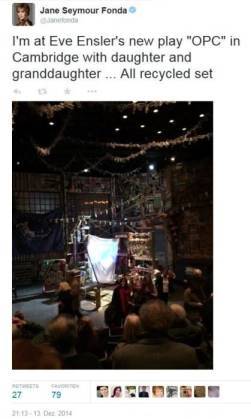 And after the show she joined the cast for a picture: 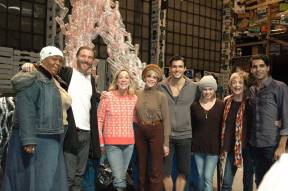 O.P.C. Turns Trash into Treasure at A.R.T. In the 1967 movie The Graduate, a family friend advised recent college grad Ben Braddock that the key to success was wrapped in one word - plastics. Ah, if only a consumer warning had come with that divine prophecy. Today, according to press notes provided by the American Repertory Theatre in Cambridge, more than 50 million plastic bottles end up in the trash every day. Every day. If not recycled, each bottle takes at least 450 years to decompose. If accumulation continues at this rate, it isn't much of a leap to imagine that soon interstellar barges will be transporting Earth's garbage to destinations unknown. But out of sight, out of mind, right? Well, not if you're playwright Eve Ensler whose new socio-political comedy O.P.C. is now enjoying its world premiere at the A.R.T. In O.P.C., Ensler mounts a full-on assault against unbridled capitalism and the wasteful consumerism that results in garbage of many kinds - plastic bottles, unworn clothes, single-use wooden pallets, and the 40% of all American food that goes uneaten each year. She does so by pitting freegan activist Romi (Olivia Thirlby), who squats in a vacant apartment building and dumpster dives for food and reusables, against her uptight but politically liberal mother Smith (Kate Mulligan) who fears that her daughter's revolutionary lifestyle will harm her chances of ascending from attorney general to U.S. Senate. When Romi fashions (or rather, trashions) an exquisite campaign dress for her mother out of apricot peels, suddenly freeganism and capitalism become strange bedfellows, and a new political platform based on eco-fashion is born. The trouble is, Romi feels that her ideals have been co-opted, and the more pressure that her mother and her publicist/boyfriend Damien (Peter Porte) put on her to sell out, the more emotionally disturbed she becomes. Suffering a breakdown which lands her in a psychiatric hospital, Romi is diagnosed with a new mental illness - O.P.C. (Obsessive Political Correctness). She's just too righteous for her own good. Ensler and director Pesha Rudnick present O.P.C. as part parody, part farce. They are most successful in striking comic blows when riffing on daytime talk shows (I'm looking at you, Oprah), self-help gurus (Deepak Chopra), and high fashion (the devil truly does wear Prada). They also delightfully skewer the marketing-driven campaign process by having Smith's older daughter Kansas (a terrific Nicole Lowrance) serve as a data-spewing machine more obsessed with winning than her own mother is. O.P.C. sputters, though, when the humor gets bogged down in the message. Romi spouts countless statistics as host of a web series "Waste Not Want Not" which she broadcasts from her squat and from various dumpster locations. Smith stumps from her perch on the campaign trail, and the sound bites come fast and furious. Too often we hear Ensler's preaching, although both Thirlby and Mulligan do manage to make their speeches flow naturally and earnestly. They end up giving life and dimension to their characters, making them a lot of fun to watch. Also a hoot are an ensemble of players doing double and triple duty in cameo appearances. Liz Mikel as talk show host "P" bulldozes over her guests, asking and answering her own questions. Nancy Linehan Charles is particularly funny as a senior citizen and fellow freegan who seems to have come to the movement as much for company as for the cause. Babak Tafti provides comic and then real spiritual enlightenment first as Doctor Day and then as Romi's patient/friend Prakash. Michael T. Weiss (so memorable as Valmont in "Les Liaisons Dangereuses" at the Huntington Theatre Company a few years ago) is somewhat wasted as Smith's second-banana husband Bruce. Yet, he lends balance and emotional support to both his wife and daughter Romi, suggesting that he admires each of them for their passion and beliefs. As the shrewd publicist Damien, Porte nicely embodies a young man caught between his desire to do good and the heady rush of power that comes with sudden financial and political success. he real stars of O.P.C., however, are the remarkable sets and costumes by designers Brett J. Banakis and ESosa. Culling from local businesses and the Harvard Recycling Center, they and their crews have turned trash into treasures. Hundreds and hundreds of cardboard boxes from supermarkets and liquor stores have been turned into massive exterior walls. Wooden shipping pallets and a repurposed shopping cart have been transformed into the floors, walls and furniture of Romi's squat. What look to be thousands of plastic water bottles festoon the rafters of the Loeb Drama Center theatre serving as chandeliers and party streamers. Clotheslines are adorned with rows and rows of mittens while abandoned Barbie dolls and other discarded toys and trinkets decorate the scenery. Romi's clothes, too, are trashioned from yoga mats, straws and coffee stirrers. An entire Fruit Skin haute couture line of high trashion dresses and menswear seem to have, in fact, been made out of vibrantly colored edible fruit rolls. It's hard to say what kind of an impact O.P.C. will have on consumer-driven politics as usual. If it can get theater-goers laughing while also thinking about their own actions and outcomes, however, perhaps that's a good enough place to start. Source: Jan Narg, BroadwayWorld, Dec 19, 2014
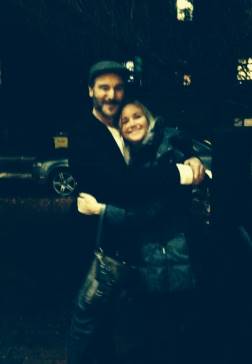
Liberty Bradford Mitchell posted this photo earlier today on her facebook page with the following byline: Caught my director Michael T. Weiss in Boston on the other side of the stage, playing Bruce in Eve Ensler's new play, "O.P.C."! 2014 started with "The Pornographer's Daughter" world premier in San Francisco and ended with a mini-series development deal. Wow. Never let those dreams die, folks. See you at our next run at the Hollywood Fringe Festival June 2015, if not before! Happy New Year! Source: libertythepd @ facebook, Jan 5, 2015
|